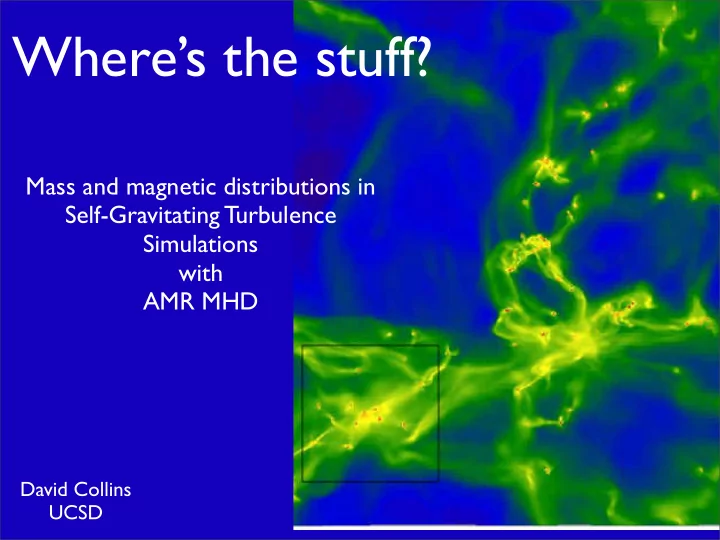

Where’s the stuff? Mass and magnetic distributions in Self-Gravitating Turbulence Simulations with AMR MHD David Collins UCSD
A story about power-laws.
(Collins, Xu, Norman, Li, Li 2010) (Collins, Padoan, Norman, Xu 2010) • AMR, MHD, Enzo • 2048 effective
Supersonic Turbulence • Dual Role • Log Normal Density PDF • Used to predict IMF, Star Formation Rate, etc.
Gravity? Powerlaw ∝ P ( ρ ) ∝ ρ − 1 . 6 − ∝ P sim ( ρ ) ∝ ρ − 1 . 5 (Kritsuk, Norman, Wagner 2010) (Collins, Padoan, Norman, Xu 2010)
Where’s the B? P ( B ) ∝ B − 2 . 7
∝ B ∝ ρ 0 . 5
∝ P ( ρ ) ∝ ρ − 1 . 5 ρ ∝ B 2 ∝ P ( B ) ∝ B − 3
“Mass To Flux” B los ∝ M N Φ t=0.75 t=0 × − (Troland+2008) B los ∝ N 0 . 6 (Falgarone+2008)
∝ n ( M ) ∝ M − 2 . 1 ± 0 . 6 Consistent with Prestellar Cores.
Ambipolar Diffusion • I don’t have it. • Things look pretty good. • Do I need it? • When do I need it?
v R AD = v AD ∇ × γ χ ρ 2 v AD = B 2 ℓ ∝ R AD = γ χ ρ 2 v ℓ B − 2
∝ R AD = γ χ ρ 2 v ℓ B − 2 Chemistry Simulated (not simulated: guess)
= χ ρ • Dynamics>>Recombination = χ ρ Constant • Dynamics<<Recombination χ ∝ ρ − 1 / 2 v
t=0.75 t=0
R AD = χ ρ 2 v ℓ B − 2 v
R AD = χ ρ 2 v ℓ B − 2 v
R AD = χ ρ 2 v ℓ B − 2 v
Conclusions • Turbulence + Gravity = Lognormal + Powerlaw • +Magnetic Fields = Large field strengths+Powerlaw • AMR + MHD necessary to probe Star Formation • Excellent agreement with observed “Mass to Flux” • Excellent agreement with observed mass distribution • Diffusion maybe unimportant.
Recommend
More recommend